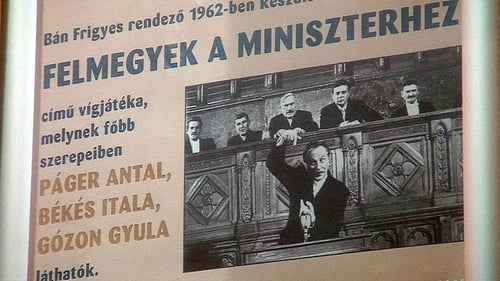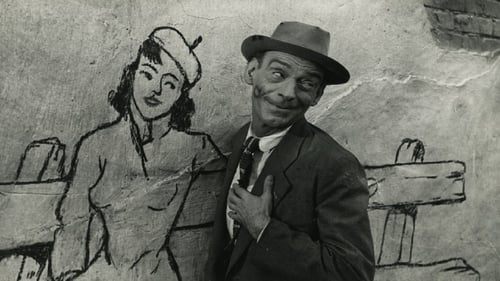Sándor Tompa
Nacimiento : 1903-12-21, Kézdivásárhely, Austria-Hungary [now Tirgu Secuiesc, Romania]
Muerte : 1969-12-18

Dr. Kató
This ironic comedy is set in the god-forsaken Kiskúnbékás, at the end of the fifties. There are no jobs, the town's "golden team", who once were third class national soccer players have scattered

Kerekes bácsi
Péter and Pál, two notorious skirt hunters competing in wooing Oana, a pretty Romanian girl on the beach at Tihany. A couple of days later the girl gets a telegram saying that she has to leave for Bucharest immediately. The party - which has increased with Piri, the interpreter, and Ági, the hitch-hiker - gets to a Romanian village by Peter's ramshackle car, a 1921 Colymne. The car, however, breaks down.

In a little town named Lombos, suddenly a smelly, sulphonic thermal water gush out. Félix Szombathy, a swindler sees a great business opportunity in this. He founded a fraud company and promised to revive the town.

Lipiczky
Based on a novel by Dezso Kosztolani, this Hungarian drama is set at the turn of the 20th century. A young, homely woman lives at home with her mother and retired father. Because of all the care the girl provides for her parents, the couple becomes detached from the world outside their home. When the girl leaves for a short visit to her uncle's home, the parents realize the extent of their separation from society and their selfish feelings toward their own daughter.

Esperes
A comedy about the organisation of agricultural co-operatives. In the village of "Rendes", everybody has already entered the co-op, only the stubborn farmer, Bódog Balogh continues to resist. The leadership plays all their tricks and uses all their efforts, but all in vain.

Fõkönyvelõ
Bene, tired of the professional battles of engineers and trying to escape a ship-wrecked marriage, asks to be transferred to the country. The gravest problem of the sandy region in Nagyalföld (Great Hungarian Plain) is the shortage of water. The tireless director of the local state farm asks for Bene's support, but the disillusioned man refuses him.

Oláh
Vetró János, the lorry driver, is an alcoholic. His marriage is in pieces, his wife has a lover. Their son suffers an accident. The next day his wife moves out. In his desperation, Vetró drinks even more, and leaves his work as well.

foreman Mihalik

The "sleepless years" in this propaganda piece by director Felix Marlassy occur on Csepel Island, an island south of Budapest that is home to an armaments factory. The factory workers are shown being exploited by imperialists, capitalists gone berserk, and fascists, more or less in that exact chronological sequence. The heavy-handed approach does much to undercut the belief that when socialism finally takes over, the lives of the workers are brought up to a human level. In this instance, audiences might prefer a more nuanced and subtle statement, no matter what the message.

1932, Budapest. Gere János, an unemployed worker searching for employment in the capital, is organised into the secret police after a raid. Summary justice is declared, and the police wants to find an illegal communist press at any price. Gere, wandering about in the dark city, joins a man, helping him to carry his luggage. Slowly, Gere learns that his companion is a Communist and his task is to keep the press machine hidden from the police.

Husband

Seszták
The film is an interpretation of everyday life and privacy as well as the first love-triangle story after 1945. Benkő Lajos, the country librarian, is stationed in the capital. In lack of a suitable apartment, his wife and children have to stay in the country.

Dani, the few-month-old little boy born outside marriage is left by Eszter in the lap of her companion on the train. The widowed Aranka takes him willingly to her. The child is already ten years old and has a good life with Aranka. Then Géza enters their life and he does not welcome the child of someone else.

Zülfilkár
Buda is mastered by the Turks. Student Gábor and his companion flee a troop into the castle, just in the garden of Gül Baba. Gábor and Leila, the daughter of Gül Baba fall in love with each other. Ali pasha, who wants to marry the girl, has the two Hungarians caught in order to let them be executed.

Dr. Króny

Fõkincstárnok
The tyrannical king is afraid of his people. He can only find peace if everyone wishes him well when he sneezes. Catchpoles raid the country and give orders what the king wants.

Kányai
Liliomfi is a 1954 Hungarian comedy film directed by Károly Makk. It was entered into the 1955 Cannes Film Festival. Set in the "Golden Era" of the wandering Hungarian theatre troupes. Mariska and Liliomfi fall in love without suspecting that Mariska's foster father, Professor Szilvay, is also Liliomfi's uncle. Soon the couple must contend with the professor's plan to make Liliomfi give up his "unrespectable" profession of acting by exposing the professor's hypocrisy, greed, and tyrannical selfishness.

On the Spring of 1945 the Jackson circus is heading towards the border with the clown Peti and Aida, the elephant. They have to play for the Hungarian Fascists, while Peti is hiding the Jew Annuska and Sanyika.

Szöllõsi
Kiskrajcár is a 1953 Hungarian film directed by Márton Keleti. It was entered into the 1954 Cannes Film Festival.

Józsika Báró
March 15, 1848; the revolution breaks out in the town of Pest. Yet at café Pilvax, in among he revolutionary youth, there is the informer of the imperial court as well. Hearing the news of the attack led by Jellasics, the inhabitants of the villages pour into the national army, and Hajdú Gyurka also escapes from his landlord. Petőfi is there at the camp of the revolutionaries, raising them to enthusiasm with his poetry.

Balogh papa
In the vocational school the professionally excellent Dani János works on his own invention in his leisure time, but he does not like learning. However, even his own father learns in the evenings, he will become a teacher.

Csótány
Pista Rácz, bearer of the title "outstanding workman" is opposed to all forms of sport, and is especially antagonized by Jóska Teleki, a first-class sportsman, who seems to be a drawback for Rácz's brigade in terms of work quantity performance figures.

rich

Csizmadia

Miklós Horváth
Különös házasság is a 1951 Hungarian drama film directed by Márton Keleti. It was entered into the 1951 Cannes Film Festival.

A female worker in Socialist Hungary gains the acceptance of her male colleagues.

The main character in the story that takes place in 1896, year of the millennium, is Szakhmáry Zoltán, who, in sharp contrast with the people around him, is neither a cynic nor a lewd, not even someone with a tendency for showing off his strength. Instead, he strives to become a humane person with enough common sense and modern thinking.

A young artist living 'off-grid' in the mountains meets a young woman, visiting the village below, wandering in the forest; and they quickly fall in love.

Puszta Máté

Kukac
Venice Film Festival 1940

The film takes place in Russia during the World War I. Three Hungarian POWs are on the run from their Russian captives. One of them gets shot down. Lieutenant Balogh and Miska, his servant, are brought before Szergej Dragow. The Russian offers to take them on to serve him. Balogh says yes, only to attempt to escape later.

Vidéki vevő

Mózsi
A 1938 film.






















